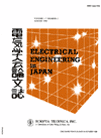
ELECTRICAL ENGINEERING IN JAPAN
Scope & Guideline
Driving Technological Progress in Electrical Fields
Introduction
Aims and Scopes
- Power Systems and Control:
Research related to the dynamics, stability, and control of electrical power systems, including renewable energy integration, grid stability, and energy management systems. - Electrical Machines and Drives:
Studies focused on the design, modeling, and control of electrical machines and drive systems, including motors, generators, and energy conversion technologies. - Renewable Energy Technologies:
Innovative solutions and technologies related to renewable energy sources such as solar, wind, and energy storage systems. - Electromagnetic Compatibility and Noise Control:
Research addressing electromagnetic interference, noise reduction techniques, and the compatibility of electrical devices in various environments. - Advanced Materials and Devices:
Development and characterization of new materials and devices, including semiconductors, sensors, and actuators used in electrical engineering applications. - Energy Efficiency and Sustainability:
Technologies and methodologies aimed at improving energy efficiency and sustainability in electrical systems and devices.
Trending and Emerging
- Smart Grids and Energy Management:
An increasing focus on smart grid technologies, including demand response, energy management systems, and integration of distributed energy resources, highlights the industry's shift towards more intelligent and resilient energy systems. - Electric Vehicles and Transportation Electrification:
Research related to electric vehicles, charging infrastructure, and associated technologies is on the rise, driven by the urgent need for sustainable transportation solutions. - Advanced Control Strategies and Automation:
Emerging control methodologies, including model predictive control and adaptive control systems, are gaining prominence as industries seek to optimize performance and efficiency in complex electrical systems. - Renewable Energy Systems Integration:
The integration of renewable energy sources into existing power systems is increasingly important, leading to research on grid stability, energy storage solutions, and innovative forecasting methods. - Materials for Energy Applications:
Research on novel materials, such as high-temperature superconductors and advanced composites, is trending as they play pivotal roles in enhancing the performance of electrical devices and systems.
Declining or Waning
- Traditional Power Generation Systems:
Research on conventional fossil fuel-based power generation has decreased, likely due to the global shift towards renewable energy sources and sustainability. - Basic Theoretical Studies:
The focus on fundamental theoretical studies in electrical engineering has waned in favor of more applied research that addresses current industry challenges and technological innovations. - Low-Power Electronic Devices:
There has been a noticeable reduction in publications related to low-power devices, possibly due to the industry's increasing emphasis on high-efficiency and high-performance solutions.
Similar Journals
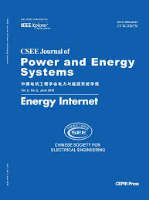
CSEE Journal of Power and Energy Systems
Exploring New Frontiers in Power SystemsCSEE Journal of Power and Energy Systems is a leading peer-reviewed academic journal published by the China Electric Power Research Institute, dedicated to advancing innovations in the fields of electrical and electronic engineering, energy systems, and materials science. With an impressive impact factor and recognition as a Q1 journal in its respective categories in 2023, it ranks among the top in Electrical and Electronic Engineering, Electronic, Optical and Magnetic Materials, and General Energy, showcasing its critical role in disseminating high-quality research. Since its transition to Open Access in 2015, the journal has made significant scholarly work freely accessible to researchers, professionals, and students globally, promoting collaboration and knowledge sharing across disciplines. The journal invites contributions that address contemporary challenges and innovations in power and energy systems, reflecting its commitment to supporting the sustainable development of energy resources and technologies.

Journal of Electrical Engineering & Technology
Pioneering Insights into Electrical Engineering ProgressJournal of Electrical Engineering & Technology is a prominent academic journal published by SPRINGER SINGAPORE PTE LTD, dedicated to advancing the field of Electrical and Electronic Engineering. With an established history since 2008, the journal has become a vital resource for professionals, researchers, and students seeking to explore innovative research and technological developments within the discipline. The journal boasts a commendable 2023 Scopus Rank of #334 out of 797 in its category, reflecting its quality and the impact of published works. As a Q2 category journal, it upholds rigorous peer-review standards, making it a credible platform for disseminating groundbreaking findings. While currently not an open-access publication, the journal ensures that its content is accessible to a global audience committed to knowledge enhancement and technological progress. Subscribe or access issues through institutional affiliations to stay at the forefront of advancements in electrical engineering.

Elektrotehniski Vestnik
Cultivating Insight and Innovation in Electrotechnical StudiesElektrotehniski Vestnik is a respected journal in the field of Electrical and Electronic Engineering, published by the ELECTROTECHNICAL SOCIETY OF SLOVENIA . With a history dating back to 1969, this journal serves as a platform for disseminating innovative research, technical advances, and practical applications within the electrical engineering domain. Although currently classified in the Q4 quartile according to the 2023 ranking, the journal’s commitment to fostering knowledge within Slovenia and the wider scientific community remains unwavering. The absence of an open access option highlights the journal's traditional publishing model, aimed at ensuring quality and integrity in the peer review process. Researchers, academics, and students interested in exploring emerging trends and foundational topics will find Elektrotehniski Vestnik to be an indispensable resource for both immediate insights and long-term reference in their work and studies.
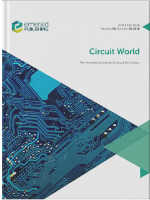
CIRCUIT WORLD
Advancing Knowledge in Electrical EngineeringCIRCUIT WORLD, published by Emerald Group Publishing Ltd, is a pivotal academic journal in the fields of Electrical and Electronic Engineering and Industrial and Manufacturing Engineering. Established in 1974, this journal has provided a vital platform for researchers and professionals to disseminate their findings and advancements over nearly five decades. With a notable Q3 ranking in both categorization areas as of 2023, CIRCUIT WORLD emphasizes the importance of innovation and practical applications in engineering. The journal facilitates the exchange of ideas, featuring case studies, reviews, and cutting-edge research that address contemporary challenges in the industry. Although not an open-access journal, it remains dedicated to contributing significantly to the academic community, making it an essential resource for students and professionals committed to advancing their knowledge and expertise in these dynamic fields. With a focus on providing insights into current trends and future directions, CIRCUIT WORLD stands out as a crucial catalyst for scholarly collaboration and innovation.
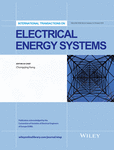
International Transactions on Electrical Energy Systems
Advancing Knowledge in Electrical Energy DynamicsInternational Transactions on Electrical Energy Systems is a distinguished peer-reviewed journal published by WILEY-HINDAWI, focusing on the dynamic field of electrical energy systems. With an impactful reach, this journal, with ISSN 2050-7038, has established itself as a prominent resource for researchers and practitioners in electrical and electronic engineering, energy engineering, and power technology since its inception in 2012. As of 2022, the journal transitioned to an Open Access model, ensuring widespread accessibility to cutting-edge research and advancements. It is recognized for its strong academic standing, holding a Q2 quartile ranking across multiple disciplines, including modeling and simulation. The journal's Scopus ranks reflect its influence, with rankings in the 76th to 87th percentiles across various fields. The International Transactions on Electrical Energy Systems is dedicated to fostering innovation and encouraging collaboration within the energy community, making it an essential platform for knowledge dissemination and discussion.
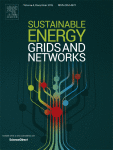
Sustainable Energy Grids & Networks
Pioneering the Future of Energy Grids and NetworksSustainable Energy Grids & Networks, published by ELSEVIER, stands at the forefront of research in energy systems, contributing significantly to the fields of Control and Systems Engineering, Electrical and Electronic Engineering, and Energy Engineering and Power Technology. With an impressive impact factor, this journal is ranked in the top quartile (Q1) for key engineering categories, affirming its authority and influence within the academic community. The journal is dedicated to publishing high-quality research focused on the sustainable integration of energy systems and smart grid technology, which is crucial in addressing the pressing challenges of climate change and energy consumption. Although it operates on a subscription model, the rigorous peer-review process ensures that only the most innovative and impactful studies are disseminated, promoting advancements in renewable energy and sustainability. As a critical resource for researchers, professionals, and students, Sustainable Energy Grids & Networks provides a platform for the exchange of ideas that drive the future of sustainable energy solutions, fostering collaboration and knowledge-sharing across disciplines.
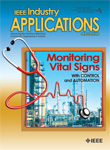
IEEE INDUSTRY APPLICATIONS MAGAZINE
Inspiring the Next Generation of Industry Leaders.IEEE Industry Applications Magazine, published by the IEEE Institute of Electrical and Electronics Engineers, is a distinguished periodical that dives into the multifaceted field of industrial applications of electrical and electronic engineering. With its roots dating back to 1995 and advancing through to 2024, the magazine offers practitioners and researchers valuable insights through a range of articles that cover emerging trends, innovative technologies, and practical solutions across key areas including Control Systems, Energy Engineering, and Industrial Manufacturing. Although not an open access journal, it holds a notable Q3 ranking across multiple categories, revealing its relevance and contribution to the industry. The journal serves as an essential resource for professionals seeking to stay abreast of advancements and methodologies that drive the industrial sector forward. As a prominent publication in its field, IEEE Industry Applications Magazine plays a critical role in fostering knowledge exchange and shaping future innovations in engineering.

IEEE Electrification Magazine
Navigating the Evolving Landscape of ElectrificationIEEE Electrification Magazine, published by the Institute of Electrical and Electronics Engineers (IEEE), serves as a pivotal platform in the field of Electrical and Electronic Engineering. With an ISSN of 2325-5897 and an E-ISSN of 2325-5889, this esteemed journal aims to bridge the gap between research and practical applications in electrification, addressing current trends and technological advancements since its inception in 2013. Notably recognized as a Q1 journal in Electrical and Electronic Engineering and a Q2 journal in Energy Engineering and Power Technology for 2023, it ranks in the 72nd and 69th percentiles, respectively, within its categories according to Scopus. As a vital resource for researchers, professionals, and students, it delivers thought-provoking articles that stimulate discourse and innovation within the electrification landscape, though it currently does not offer open access. The editorial excellence and rigorous peer-review process ensure that each published piece contributes meaningfully to the dynamic field of electrification, solidifying the journal’s importance as a leading voice in advancing engineering practices and education.

Batteries-Basel
Innovating Battery Science for a Sustainable TomorrowBatteries-Basel, published by MDPI, is a premier open-access journal since 2015 that aims to serve the growing community focused on the technological advancements and innovations in battery science and related fields. Operating from its base in Switzerland, this journal publishes high-quality research covering the fields of Electrical and Electronic Engineering, Electrochemistry, and Energy Engineering and Power Technology. With a commendable Q2 ranking in multiple categories for 2023, it consistently strives to present cutting-edge studies, reviews, and practical applications that drive progress in energy storage technologies. Researchers and professionals will find invaluable insights within its pages, contributing to both theoretical understanding and practical deployment of battery technologies. Open access provides broad dissemination of knowledge, ensuring that discoveries reach a global audience, and fostering collaborative efforts to address the challenges posed by modern energy demands.
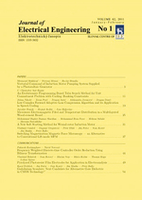
Journal of Electrical Engineering-Elektrotechnicky Casopis
Exploring the Frontiers of Electrical and Electronic Solutions.Journal of Electrical Engineering - Elektrotechnicky Casopis is a distinguished peer-reviewed journal published by Slovak University of Technology, dedicated to advancing the field of Electrical and Electronic Engineering. With an ISSN of 1335-3632, this journal aims to disseminate high-quality research findings, innovative methodologies, and significant technological advancements that contribute to the development of electrical engineering practices. Operating since 2004, it embraces an open-access model to enhance the visibility and accessibility of scholarly articles, thereby fostering knowledge exchange within the global research community. The journal holds a respectable Q3 categorization in the field, ranked 544 out of 797 in Scopus, indicating its growing influence within the discipline. Through rigorous peer-review processes, it provides a platform for researchers, professionals, and students alike to publish their work and stay informed on cutting-edge developments. Located in Bratislava, Slovakia, the journal is an essential resource for anyone involved in the rapidly evolving world of electrical engineering.